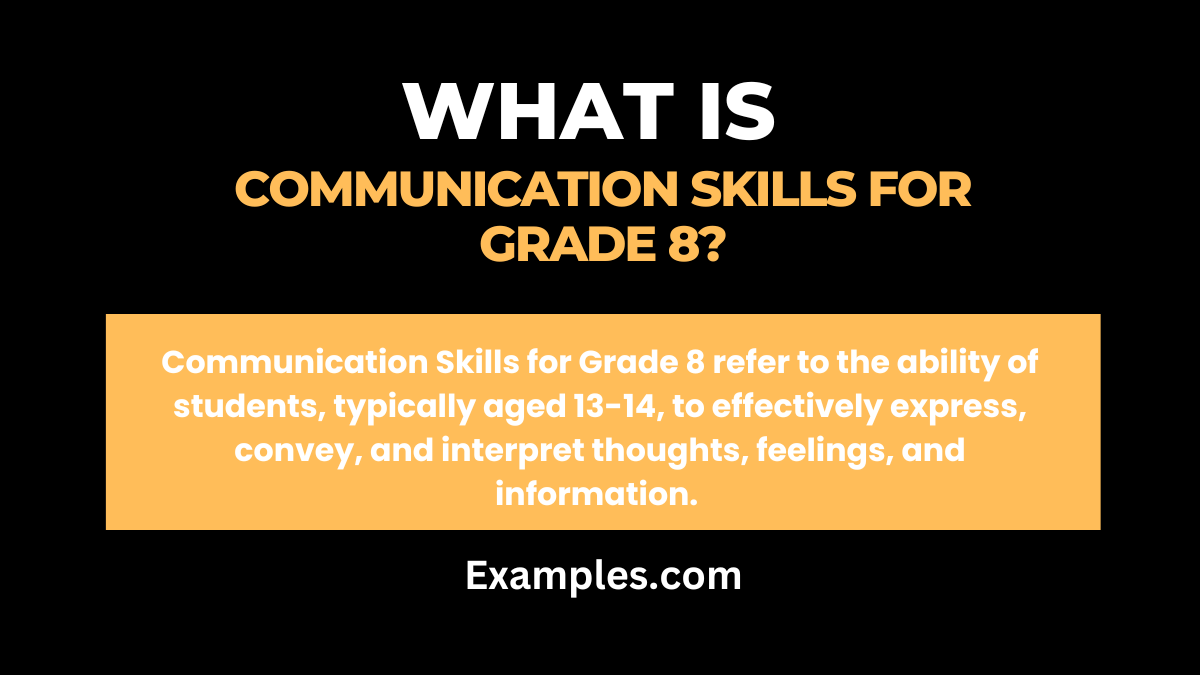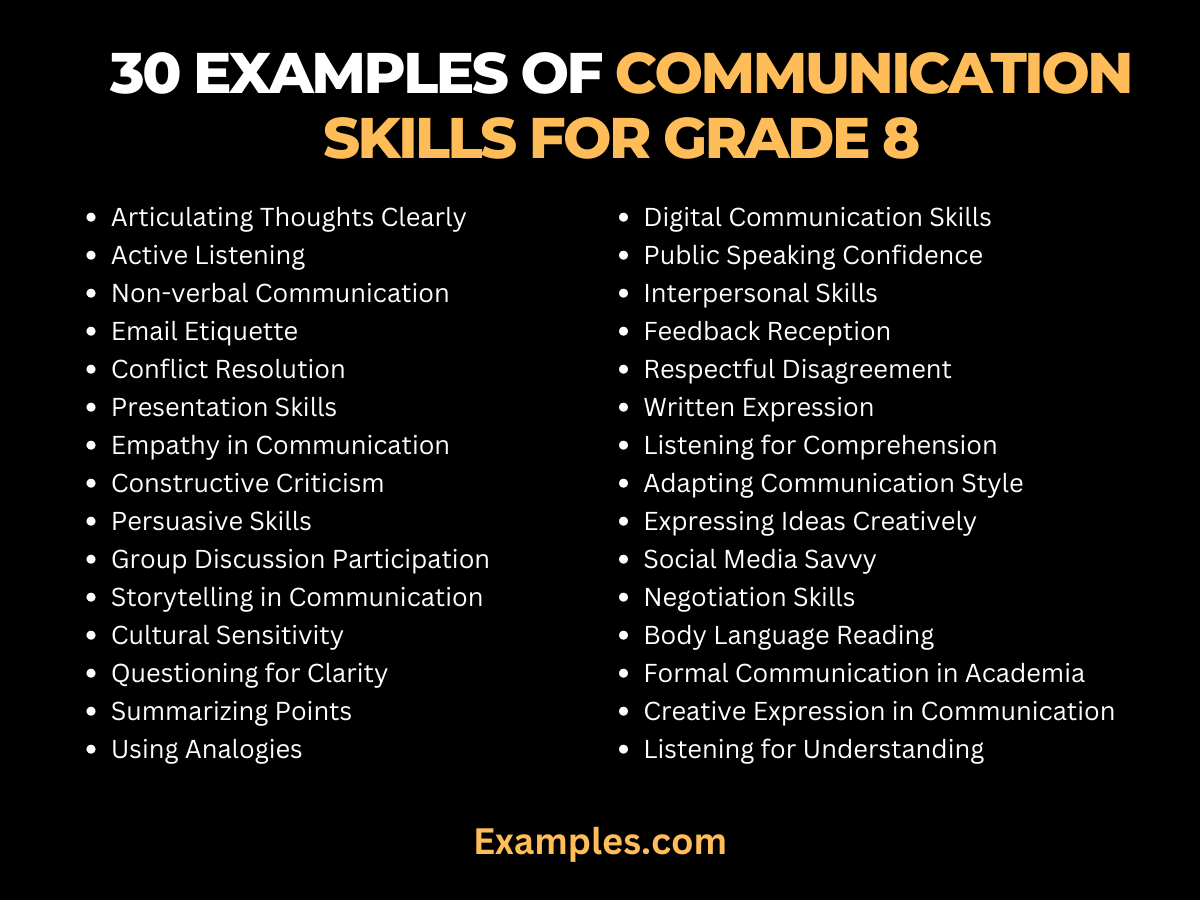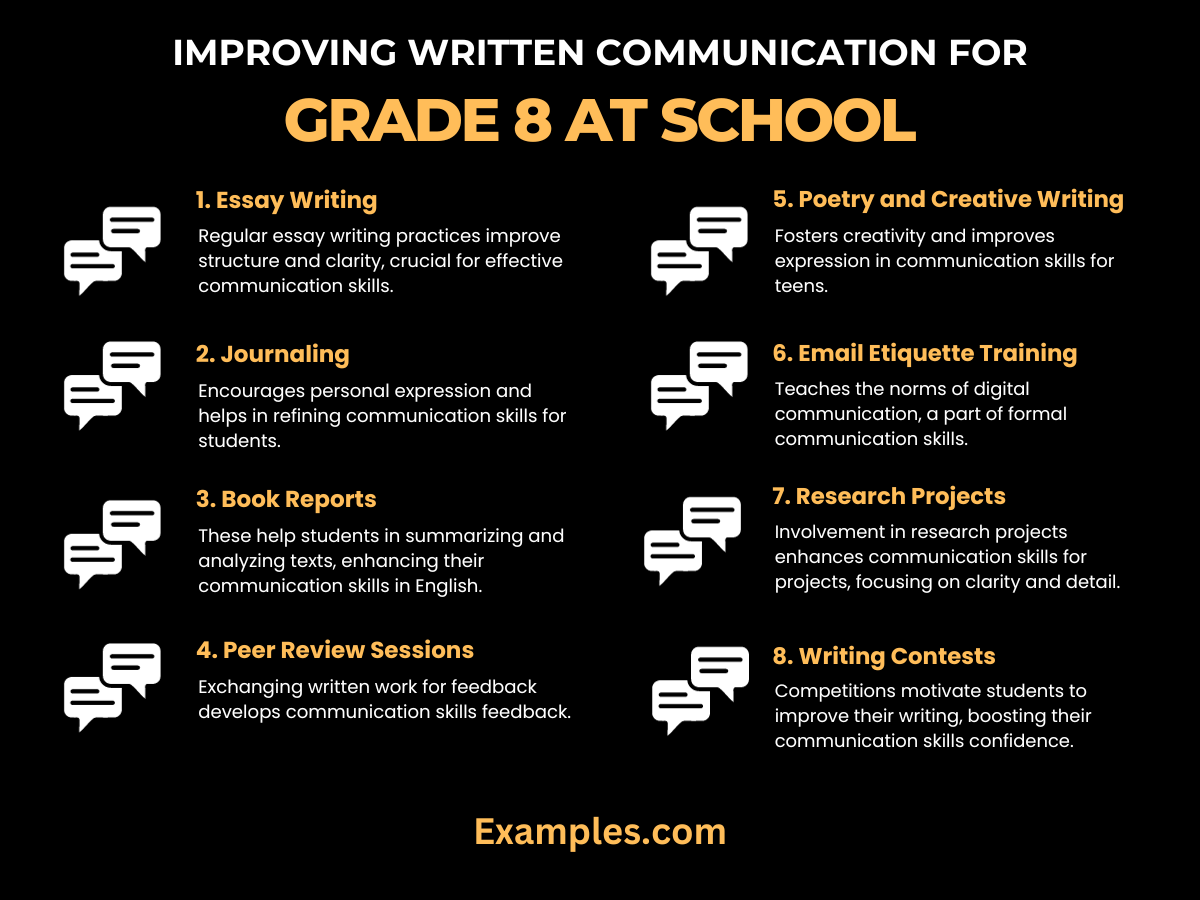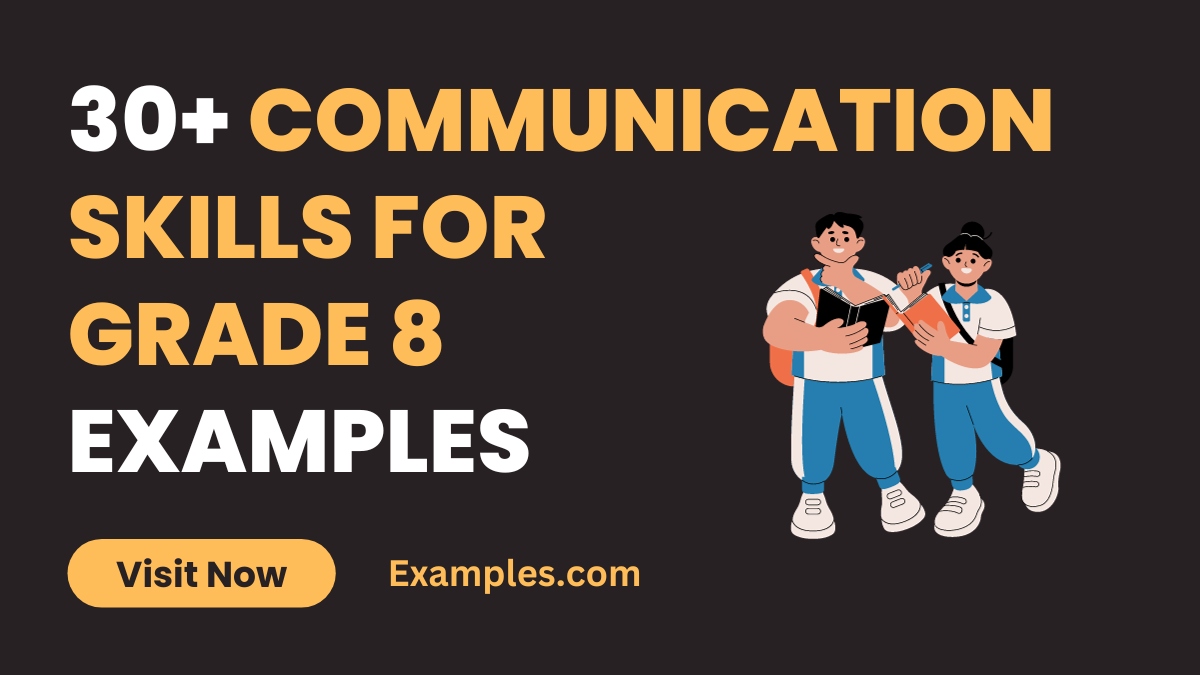Communication Skills for Grade 8
Navigating the world of communication in Grade 8 can be a challenging yet rewarding journey. As students delve deeper into adolescence, mastering effective communication becomes crucial for their academic and personal growth. Our comprehensive guide, enriched with real-life “Communication Examples,” is designed to offer a treasure trove of insights and practical strategies. It provides a roadmap for Grade 8 students to enhance their verbal, non-verbal, and digital communication skills. From classroom interactions to digital dialogues, this guide is an essential tool for developing the art of effective communication, preparing young learners for success in diverse settings.
What is Communication Skills for Grade 8?

Communication Skills for Grade 8 refer to the ability of students, typically aged 13-14, to effectively express, convey, and interpret thoughts, feelings, and information. This skill set includes verbal communication (like speaking and listening), non-verbal communication (such as body language and facial expressions), and written communication (writing clearly and comprehensively). At this educational level, students learn to refine these skills to interact appropriately and effectively in various settings, ranging from academic environments to personal and digital interactions. These skills are crucial for their overall development and success in school and social situations.
30 Examples of communication skills for grade 8
In Grade 8, effective communication skills are pivotal for navigating complex social and academic landscapes. This crucial stage demands an enhancement of both verbal and non-verbal skills, active listening, digital communication proficiency, and the ability to articulate thoughts and feelings with clarity and empathy. Our guide presents 30 distinct examples of communication skills tailored for Grade 8 students, each accompanied by explanations and practical how-to examples. These skills range from engaging in meaningful group discussions to mastering the nuances of digital etiquette. This comprehensive collection is an invaluable resource for students to develop a robust communication skillset, fostering successful interactions in various spheres of their lives.

- Articulating Thoughts Clearly: Communicate thoughts in a structured, clear manner.
Example: When presenting an idea, use simple yet effective language to convey your point. - Active Listening: Show genuine interest in what others are saying.
Example: Nod and provide feedback like, “That’s an interesting point; tell me more.” - Non-verbal Communication: Use body language to support your message.
Example: Maintain eye contact and use hand gestures for emphasis. - Email Etiquette: Write emails with a clear subject, polite greeting, and concise content.
Example: “Dear [Name], I’m writing to discuss our group project. Here are my thoughts…” - Conflict Resolution: Resolve disagreements with understanding and respect.
Example: “I see your point. Let’s find a middle ground we both agree on.” - Presentation Skills: Present ideas confidently in front of an audience.
Example: Use a clear voice and structured points when giving a presentation. - Empathy in Communication: Understand and acknowledge others’ feelings.
Example: “I can see why you feel that way. How can I help?” - Constructive Criticism: Offer feedback that is helpful and not hurtful.
Example: “Your essay was good, but adding more examples could make it stronger.” - Persuasive Skills: Convince others with logical arguments and charisma.
Example: “If we start our project now, we’ll have more time for revisions, leading to a better result.” - Group Discussion Participation: Actively contribute to group conversations.
Example: “I agree with your point, and I’d like to add that…” - Storytelling in Communication: Use stories to make your communication engaging.
Example: “This reminds me of a story where a similar strategy worked.” - Cultural Sensitivity: Communicate with awareness and respect for cultural differences.
Example: “I’m interested to learn more about your traditions; can you tell me about them?” - Questioning for Clarity: Ask questions to understand better.
Example: “Can you explain a bit more about what you mean by that?” - Summarizing Points: Summarize discussions to ensure understanding.
Example: “So, to summarize, our main goals are…” - Using Analogies: Explain concepts using analogies for better understanding.
Example: “This ecosystem is like a community where each part has a role.” - Digital Communication Skills: Communicate effectively through digital platforms.
Example: Use clear and respectful language in online discussions. - Public Speaking Confidence: Speak in public with confidence and clarity.
Example: Practice speeches to become comfortable speaking in front of others. - Interpersonal Skills: Develop strong one-on-one communication.
Example: Engage in meaningful conversations with peers and teachers. - Feedback Reception: Accept and apply feedback constructively.
Example: “Thank you for the feedback; I’ll work on those areas.” - Respectful Disagreement: Express differing opinions respectfully.
Example: “I see it differently, and here’s why…” - Written Expression: Write clearly and effectively for various purposes.
Example: Write essays and reports with structured arguments and supporting evidence. - Listening for Comprehension: Listen not just to respond, but to understand.
Example: Focus on understanding the speaker’s point before formulating a response. - Adapting Communication Style: Alter communication style according to the situation.
Example: Use formal language in academic settings and informal language with friends. - Expressing Ideas Creatively: Use creativity to express ideas in unique ways.
Example: Incorporate visual aids or metaphors in presentations. - Social Media Savvy: Navigate social media communication effectively.
Example: Post and comment thoughtfully and respectfully online. - Negotiation Skills: Negotiate to find mutually beneficial solutions.
Example: “If we both compromise here, we can both benefit.” - Body Language Reading: Interpret and respond to non-verbal cues.
Example: Adjust your approach if you notice someone is uncomfortable. - Formal Communication in Academia: Use formal communication in academic settings.
Example: Address teachers and write academic papers using formal language. - Creative Expression in Communication: Use creative means like art or music to express ideas.
Example: Create a piece of art to convey a message. - Listening for Understanding: Listen to understand, not just to reply.
Example: Focus on the speaker’s message and clarify if needed.
Communication Skills for Grade 8 at School
Developing communication skills for Grade 8 at school is crucial for students’ academic and social growth. This stage involves honing abilities in communication skills for students, effective communication skills, and communication skills in classroom. These skills aid in better understanding, collaboration, and expression.
- Group Projects: Encourage students to work in diverse groups. This helps in developing collaboration in communication skills and understanding different perspectives.
- Classroom Presentations: By doing presentations, students enhance their presentation skills in communication, gaining confidence in public speaking.
- Peer Feedback Sessions: These sessions foster communication skills feedback, allowing students to give and receive constructive criticism.
- Role-Playing Exercises: Role-playing different scenarios teaches empathy and interpersonal communication skills.
- Debate Clubs: Participating in debates sharpens argumentative skills and persuasion in communication skills.
- Listening Exercises: Activities focused on listening improve active listening in communication skills, a key aspect of effective communication.
- Storytelling Sessions: Encourages creative expression and hones storytelling as communication skill.
- Conflict Resolution Workshops: These workshops teach importance of conflict resolution in communication skills, essential for healthy interactions.
- Communication Games: Interactive games enhance understanding and usage of various types of communication skills.
- Public Speaking Clubs: Involvement in such clubs bolsters communication skills for public speaking, a vital skill for grade 8 students.
Improving Written Communication for Grade 8 Students
Enhancing written communication skills in Grade 8 is pivotal for academic success and future endeavors. This includes mastering formal communication skills, grammar, and clarity in writing.

- Essay Writing: Regular essay writing practices improve structure and clarity, crucial for effective communication skills.
- Journaling: Encourages personal expression and helps in refining communication skills for students.
- Book Reports: These help students in summarizing and analyzing texts, enhancing their communication skills in English.
- Peer Review Sessions: Exchanging written work for feedback develops communication skills feedback.
- Poetry and Creative Writing: Fosters creativity and improves expression in communication skills for teens.
- Email Etiquette Training: Teaches the norms of digital communication, a part of formal communication skills.
- Research Projects: Involvement in research projects enhances communication skills for projects, focusing on clarity and detail.
- Writing Contests: Competitions motivate students to improve their writing, boosting their communication skills confidence.
- Grammar Workshops: Specific focus on grammar aids in constructing clear and effective communication.
- Script Writing for Plays: Encourages creative storytelling and dialogue construction, key in communication skills development.
Methods for Improving Communication Skills for Grade 8 Students
Adopting various methods to improve communication skills in Grade 8 fosters overall development. This includes focusing on social communication skills, interpersonal communication skills, and communication skills confidence.
- Technology-Based Communication Tools: Utilizing apps and software to practice communication skills in a modern context.
- Mentorship Programs: Pairing students with mentors to enhance communication skills in relationships and receive guidance.
- Guest Speaker Sessions: Exposure to diverse communicators expands understanding of different communication skills for young adults.
- Group Discussions: Regular group discussions enhance group communication skills and encourage active participation.
- Communication Skill Workshops: Workshops focusing on specific skills such as empathy in communication skills or negotiation in communication skills.
- Multimedia Projects: Involving students in creating videos or podcasts to improve oral communication skills.
- Language Arts Classes: Focus on language usage, essential for communication skills in English and overall expression.
- Cultural Exchange Programs: These programs encourage understanding of diverse communication styles and enhance interpersonal communication skills.
- Feedback Mechanisms: Implementing systems for students to give and receive feedback, crucial for communication skills improvement.
- Community Service Projects: Involves interaction with different communities, enhancing communication skills in a real-world context.
What are the 10 Ways to Improve Communication Skills in Grade 8?
Improving communication skills in Grade 8 students is essential for their personal and academic development. Here are ten effective ways to enhance these skills, optimizing the focus on “communication skills”:
- Encourage Active Listening: Teach students the importance of listening attentively. Active listening is a foundational communication skill that helps in understanding and responding appropriately in conversations.
- Promote Group Discussions: Regular group discussions in class can significantly improve communication skills for students. It encourages sharing ideas and learning to respect diverse viewpoints.
- Implement Public Speaking Exercises: Encouraging students to speak in front of the class boosts their communication skills confidence. This could involve presentations, storytelling, or recitations.
- Incorporate Role-Playing Games: Role-playing different scenarios in the classroom helps students understand various communication styles and situations, enhancing their interpersonal communication skills.
- Teach Emotional Intelligence: Integrating emotional intelligence education helps students recognize and express their emotions effectively, a vital part of effective communication skills.
- Utilize Technology and Multimedia: Employing podcasts, videos, and interactive apps can make learning about communication skills more engaging and relatable for Grade 8 students.
- Encourage Writing Assignments: Regular writing assignments like journals, essays, and reports improve written communication skills. It helps students articulate their thoughts clearly and coherently.
- Feedback and Reflection Sessions: Providing constructive feedback and encouraging self-reflection aids students in understanding their communication strengths and areas for improvement.
- Facilitate Peer-to-Peer Teaching: Allowing students to teach each other or work together on projects can improve collaboration in communication skills and foster a sense of responsibility and leadership.
- Host Debates and Discussions on Current Events: This not only improves public speaking and argumentative skills but also keeps students informed and engaged, further enhancing their communication skills at school.
In conclusion, As Grade 8 students continue to grow and navigate through their academic journey, it’s essential to extend the development of communication skills beyond the classroom walls. Engaging in activities that encourage interaction in diverse real-world scenarios can significantly enhance these skills. For example, participating in community service or volunteer work can provide practical experiences where students apply their communication skills in various settings. This not only aids in developing empathy and understanding of different perspectives but also boosts their confidence in interacting with a wide range of individuals. Websites like VolunteerMatch offer a platform for young learners to find opportunities that align with their interests and skills, fostering a sense of community involvement and social responsibility.
Moreover, exploring educational resources and tools online can supplement classroom learning and provide additional avenues for skill enhancement. Resources like Khan Academy offer a vast array of educational materials, including videos and exercises on communication and related subjects, which can be invaluable for students seeking to deepen their understanding and practice their skills in a structured yet flexible manner. These digital platforms serve as an excellent supplement to classroom learning, offering interactive and engaging content that caters to the diverse learning styles of Grade 8 students.
In summary, the journey of mastering communication skills in Grade 8 is an ongoing process that extends beyond the academic environment. It involves actively seeking opportunities for practice, engagement, and learning in various contexts. By participating in community service and utilizing online educational resources, students can continue to refine their skills, preparing them for successful interactions in all areas of life.



